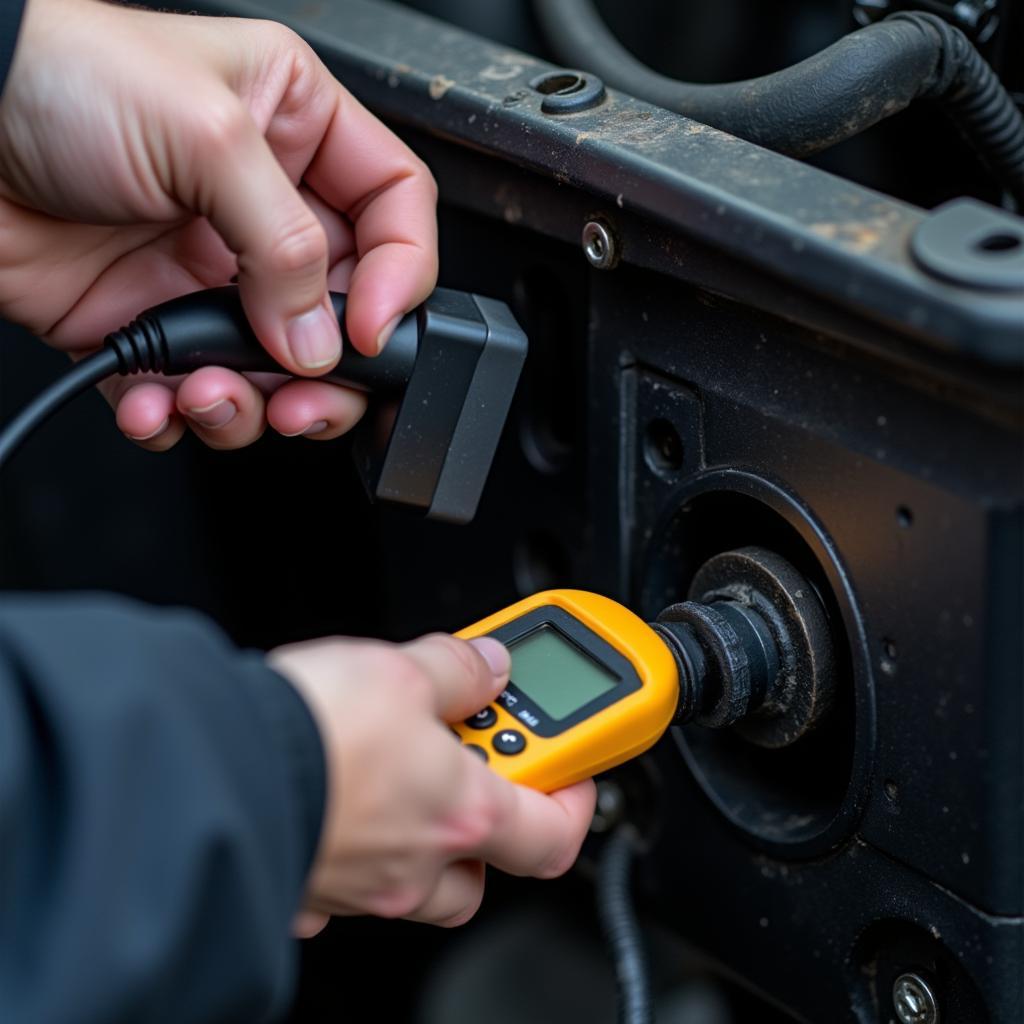Knowing the health of your car’s systems is crucial, and a car diagnostic test offers just that. But how much does this essential check-up cost? This guide dives deep into the factors influencing the cost of a car diagnostics test, helping you understand what to expect and make informed decisions for your vehicle’s well-being.
Understanding Car Diagnostic Tests
Before we delve into the costs, let’s clarify what a car diagnostic test entails. Modern vehicles are equipped with complex electronic systems controlled by a central computer, the Engine Control Unit (ECU). A diagnostics test uses a specialized scanner to communicate with the ECU, retrieving Diagnostic Trouble Codes (DTCs) that indicate potential issues.
Think of these DTCs as your car’s way of signaling a problem, like a “check engine” light. A diagnostic test deciphers these codes, providing valuable insights into the issue’s nature and location.
 Mechanic Performing a Car Diagnostic Test
Mechanic Performing a Car Diagnostic Test
Factors Affecting Car Diagnostic Test Costs
The cost of a diagnostics test can vary significantly depending on several key factors:
1. Location: Geographic location plays a role due to differences in labor rates, market demand, and business overheads. Urban areas or regions with higher living costs may have higher diagnostic test prices compared to rural areas.
2. Type of Facility: Choosing between a dealership, independent mechanic, or auto parts store can influence the price. Dealerships often charge a premium due to specialized equipment and brand-specific expertise. Independent mechanics may offer more competitive rates, while auto parts stores often provide basic code reading for free or at a lower cost.
3. Complexity of the Issue: A straightforward diagnostic test to identify a common issue might be cheaper than diagnosing a complex electrical problem or a fault requiring extensive troubleshooting. The time and expertise needed factor into the overall cost.
4. Additional Services: Some mechanics might include a visual inspection or basic checks along with the diagnostics test, potentially affecting the price.
Average Car Diagnostic Test Costs
While it’s difficult to provide an exact figure, here’s a general range:
- Basic Code Reading: $30 – $75 (often free at some auto parts stores)
- Comprehensive Diagnostic Test: $80 – $150
- Dealership Diagnostic Test: $100 – $200+
Expert Insight:
“It’s always a good practice to inquire about the cost of a diagnostic test beforehand, especially if you’re facing multiple potential issues,” says John Miller, a seasoned automotive technician with over 20 years of experience. “Transparency in pricing helps build trust and ensures you’re comfortable with the service provided.”
Is a Car Diagnostic Test Worth the Cost?
Absolutely. Consider these benefits:
- Early Detection: Identifying issues early can prevent costly repairs down the line.
- Accurate Diagnosis: A diagnostics test eliminates guesswork, leading to more effective repairs.
- Peace of Mind: Knowing the state of your car’s systems provides valuable peace of mind.
Finding Affordable Car Diagnostic Tests
Follow these tips to potentially save on costs:
- Check for Promotions: Auto repair shops often run specials or discounts on diagnostic tests.
- Inquire about Package Deals: Some mechanics offer bundled services that include a diagnostic test at a reduced price.
- Consider DIY Options: While not recommended for complex issues, affordable OBD-II scanners are available for basic code reading.
Conclusion
While the cost of a car diagnostics test might vary, the insights it provides into your vehicle’s health are invaluable. By understanding the factors influencing the price and exploring available options, you can make an informed decision that prioritizes both your budget and your car’s well-being. Regular diagnostics tests are a smart investment in your car’s longevity and your peace of mind on the road.
FAQs about Car Diagnostic Tests:
1. How often should I get a car diagnostics test?
It’s generally recommended to have your car’s systems checked annually or whenever you experience unusual performance issues.
2. Can a car diagnostics test detect all problems?
While highly effective, a diagnostics test might not detect all mechanical or physical issues. It primarily focuses on the electronic systems of your vehicle.
3. Can I drive my car with the “check engine” light on?
It’s best to address the “check engine” light promptly. While some issues might be minor, driving with certain problems could lead to further damage.
4. Do I need to go to a dealership for a diagnostics test?
Not necessarily. Reputable independent mechanics and some auto parts stores offer reliable diagnostics tests at potentially lower costs.
5. Can a car diagnostics test tell me if my brakes are bad?
A diagnostics test primarily focuses on electronic systems. Brake issues often require a separate physical inspection.
Common Situations Where a Car Diagnostics Test is Recommended:
- Illuminated “Check Engine” Light: This warning signal often indicates an issue with your engine or emissions system.
- Unusual Noises or Vibrations: Unfamiliar sounds or vibrations could signify a problem with your engine, transmission, or other components.
- Decreased Fuel Efficiency: A sudden drop in your car’s fuel economy could point to a problem with the fuel system, oxygen sensors, or other related components.
- Performance Issues: Experiencing sluggish acceleration, rough idling, or difficulty starting your car? A diagnostics test can help pinpoint the culprit.
For further insights and guidance on car diagnostic tests and related topics, explore these informative articles:
- How much is a car diagnostics test?
- How much is diagnostics test for a car?
- Can a car diagnostic toll tell you dpf sensor?
- Who does car diagnostic test?
- Can car diagnostics detect faulty alternator?
Need assistance with a car diagnostics test or have questions about your vehicle’s health? Don’t hesitate to reach out to our expert team via WhatsApp: +1(641)206-8880 or Email: [email protected]. We’re here to help 24/7!

Leave a Reply